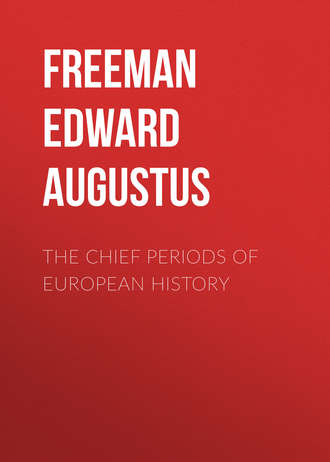 полная версия
полная версияThe Chief Periods of European History
But the Persian and the Phœnician were not the only enemies against whom the scattered Greek nation had to strive. Foes nearer to the Greek in race than the Phœnician, less widely removed in political and social institutions than the Persian, were threatening the power and the being of one great division of the Greek name. The second of the great peninsulas of southern Europe, the central one of the three, the peninsula which held Rome and Capua and the cities of the Etruscan, was beginning to come to the front in the drama of history. There was as yet no sign that Italy was to be the ruling land of the world; but there were signs that Italy was no longer to be a land in which settlers of foreign races might carve themselves homes at pleasure. The name of Rome was beginning to be heard in Hellenic ears, but it was as yet hardly a name of fear. It was as yet the native races of southern Italy that the Greek cities had to dread, and Rome was for a while the enemy of their enemies. The Persian and the Carthaginian were strictly enemies from without; the Persian was in every sense an invader of the soil of the oldest Hellas; the Carthaginian was at most winning a land in which other branches of his race had once made settlements; but the Lucanians and the other nations of southern Italy were, in the strictest sense, winning back their own land from strangers. When Kymê and Poseidônia ceased to be cities of Hellas, in one sense the boundaries of the civilized world fell back; in another we may say that they advanced, as the nations of Italy began to show that the time was come for the men of the central peninsula to play their part in the world’s history as well as the men of the older peninsula to the east of them.
By the middle of the fourth century B.C. the decline of Greece is, even on the shallowest view, allowed to have begun. But it is commonly held to have begun merely because the Macedonian kingdom was beginning to step into that position of primacy among the Greek powers which had been held at different times by the cities of Argos, Sparta, Athens, and Thebes. And as regards the political life of the great Greek cities, above all, as regards the political life of that Athens which we are so often tempted to mistake for Greece, the change was great indeed, sad indeed. But we must not forget that the political decline of the great cities of old Greece was but one part of the general political decline of the Hellenic people, and also that a large part of old Greece itself looked on the change in quite another light from that in which we are used to look at it from the purely Athenian point of view. With the voice of Dêmosthenês ringing in our ears, it is hard to listen to the calm comments of Polybios, when he hands on to us the traditions of Megalopolis and of so many other cities by whom Philip was looked on as a friend and deliverer, a pious crusader against the sacrilegious Phokian. But yet more important it is to remember that, if old Hellas lost much through the advance of the Macedonian, the younger Hellas beyond Hadria lost immeasureably more through the advance of the Phœnician and the native Italian. Cry after cry for help went up from Italy and Sicily to the motherland in Greece. A series of adventurers, republican and princely, crossed the sea to bear help to their threatened brethren or to carve out a dominion for themselves. Some went to free Greek cities from domestic tyrants, others to free them from the yoke of the advancing barbarian. That men from the motherland were needed for either work shows that the great day of the Western Greeks had passed away, that they could no longer keep either internal freedom or external independence by their own strength. And, dark as is the tale of Dionysios and Agathoklês, we cannot wholly put out of sight that even they had a brighter side as in some sort champions of Hellas against the barbarian. We must not forget Dionysios as the planter of Greek colonies on both sides of Hadria, nor Agathoklês as the man who carried the arms of Europe to the shores of Africa, the forerunner of Regulus and Scipio, of Roger of Sicily and Charles of Austria. But the mission of Diôn and of the nobler Timoleôn, the warfare of the Spartan and the Epeirot, of Archidamos and Alexander and Pyrrhos, showed that the Greeks of the West could no longer stand, even by the help of the Greeks of the old Hellenic lands or of the lands which had become Hellenic by adoption. Their doom was sealed; so before long was the doom of all lands, the lands of the Macedonian and the Carthaginian no less than the lands of the Sicilian and the Italian Greek. But the fall of Macedon and the fall of Carthage were yet far distant; those lands were reaching their highest pitch of greatness at the moment when it became plain that all that was left for the Greeks of the West was to become subjects or dependents of an Italian power.
Another point to be noticed is the close connexion between the destiny of the Eastern and of the Western Greeks. The Spartan princes sought for a career in Italy because, in face of the advance of Macedonia, there was no career left for them in old Greece. Moreover the Epeirot kings Alexander and Pyrrhos are themselves part of the Hellênismos; they are among the chiefest signs that the Hellenic name and culture had spread beyond the genealogical bounds of the Hellenic nation. Their people might have an ancient kindred with the Greeks; they themselves might come of the blood of Achilleus; but they were still, in the wider aspect of the time, Greeks by adoption only. And the career of the Epeirot kings in the West was directly suggested by the career of the Macedonian kings in the East. Their land looked towards Italy and Sicily yet more directly than Macedonia looked towards Asia; and perhaps Alexander, certainly Pyrrhos, sought to found beyond the Hadriatic a Western Greek dominion to balance the Eastern Greek dominion which the Macedonians had founded beyond the Ægæan. So it was not to be. The decree had gone forth that Greece, in her new guise, was to leaven the East, for a while to rule over the East, but that in the West the political power of the Greek race was to die out, that even its intellectual influence was to be indirect, an influence which had to accept Roman masters and disciples as its instruments.
Yet the day was coming when Rome was to rule in the East as well as in the West; she was step by step to draw all the Greek powers, those that were Greek by adoption as well as those that we may call Greek by birth, within the spell of that influence which silently changed from alliance to subjection. The details of that process, the picture of the world into which Rome burst as it were in a moment, the history in short of the third and second centuries, have, in the common course of so-called classical studies, met with a neglect which can be measured only by their paramount importance in universal history. The distinctive aspect of that age I shall have to speak of again. I wish now to point out how rich in political instruction of every kind, rich perhaps beyond every other age of so-called classical times, the age of Polybios really is. The Greek world of his day was made up of an assemblage of states, of every degree of power and of every form of political constitution. There was nothing like it in the earlier days of Greece; there was nothing like it in the after days when Rome practically became the world. But the Greek world of those days gives us a lively image of the political state of modern Europe for some ages past. The political experience of Polybios was immeasureably wider than that of Thucydides; he had in truth an experience fully as wide and varied as that of any modern statesman. Thucydides knew only the independent city, oligarchic or democratic, and the city which would fain be independent but was not. In his day kingship and federation – federation worthy to be so called – were still in the background; they hardly stood forth on the political stage; kingship was not the constitution of any acknowledged Greek power; federation was not the constitution of any Greek power of the first or even of the second rank. But Polybios could study, within the range of Greek or Greek-speaking powers, every form of kingship and every form of commonwealth. There was the national kingship of Macedonia, the king ruling over his own people. There was the local kingship of Egypt, the rule of Greek kings over a foreign nation. There was the Seleukid dominion, fallen indeed from its old greatness, but whose kings still kept up some memory of the position alike of Cyrus and of Alexander, the position of the Great King, the King of Kings, ruling over lands and cities, Greek and barbarian, of every speech, of every form of life, of every kind of relation to the central power. And the Greek city-commonwealth, fully free and independent, was still a familiar form of political life; nor need it shock us that the purest and noblest example of a Greek democracy was now to be found, not at Athens but at Rhodes. But the highest political life of Greece, above all of old European Greece, was now to be found in the federal states, in Polybios’ own Achaia, in gallant and faithful Akarnania, in the adopted Greek land of Epeiros, nay too in after days beyond the sea, among worthy imitators of Hellenic models, in that land of Lykia whose people, in the latest day as in the earliest, stand forth as the worthiest folk of Asia, alongside of the men of Achaia, worthiest folk of Europe. Achaia, Rhodes, Pergamon; it was no mean lesson to be able to study the federal commonwealth, the single city commonwealth, the kingship of a house worthy to reign, each standing forth in a model example of those three several forms of government. In such a system of states as this, instead of the simpler relations of earlier days, we come across all the complications of modern international politics. While the old republican life goes on, we see beside it the working of dynastic interests, the influence of queens and ministers, exactly as in the modern world. Diplomacy has its work to do, and a busy and constant work it is. Nor is the history of these times simply the history of petty states. Not only Macedonia and Egypt, but Pergamon, Achaia, Rhodes, were all great powers according to the standard of any earlier age. They were the leading states of their own world, the chief members of an established system in which each held its place exactly like the states of the modern world. Suddenly a foreign power broke in among them, a power far stronger than any of them, a power which came from another world beyond their range, and which in a moment changed the face of the world into which it entered. The suddenness of this irruption of Rome into the Greek world, the speed with which she sprang at once to the first place in the East as well as in the West, are among the most striking parts of the story. They stand out in marked contrast alike to the slow steps by which Rome had marched to the headship of the West and to the slow steps by which her leadership in the East was changed into direct and universal rule. Next to the delusion that the Empire of Rome came to an end in 476 A.D. stands the delusion that free Greek states came to an end in 146 B.C. This last delusion may be easier to get rid of than the other. The third and second centuries B.C. have at least the advantage of being left pretty clear from the touch of the crammer. It is easier to write on white paper than to make parchment ready for a palimpsest. It may be easier to set forth the true aspect of the age which ruled that Rome should be the head of the world than it is to set forth the true aspect of the age which answers to it, the age which ruled in what shape Rome should still remain the head of the world, though her political dominion over half her provinces was broken in pieces.
LECTURE II.
ROME THE HEAD OF EUROPE
In my last lecture I strove to draw a picture of the Mediterranean lands at the moment when the Greek world, as the Greek world had been shaped by Macedonian conquest, a world of kingdoms, federations, and single cities, a busy and intricate system full of the deepest political lessons at every step, was suddenly startled by the invasion of a power from the West. That power had already slowly risen to the first place in its own Western world; it now sprang as in a moment to the first place in the East; but, having thus sprung to the first place, it was content to fall back on its former slow and piecemeal course. Generations had to pass away before the paramount influence in the Greek world which Rome won at a single grasp was fully changed into immediate dominion over every land and city to which its influence had spread. Very early in the second century B.C. Rome was already the paramount power in the Greek world. She had not a single province east of Hadria; but cities, confederations, kingdoms, all knew that she was practically their mistress. Late in the first century A.D. Rome had many provinces east of Hadria; her immediate dominion had become the rule, and even nominal independence was the exception; but there were still free Greek cities which Vespasian deemed it prudent to bring under his immediate dominion, and there were not a few other free Greek cities which Vespasian left to give Trajan an opportunity of respecting the faith of treaties. The first step in short was sudden and swift; every later step was slow; but the first step carried every later step with it as its necessary consequence. In the interval between the First and Second Punic Wars, Rome appeared east of the Hadriatic as the deliverer of Greek cities from the pirates of Illyricum. That was in truth the first step in that eastward march by which, five hundred and fifty years later, Rome herself, in her own person, followed in the wake of her dominion, and transferred her seat from the seven hills by the Tiber to the seven hills by the Bosporos. Or shall we say that the first step was taken at a far earlier time? The position of Rome as an Italian state, ruling over Greek allies and subjects, but in return deeply affected by Greek influences of every kind, had begun while Rome still dwelled in her own peninsula. Before she crossed the Hadriatic, she had begun to put on the character of that compound power, politically Roman, intellectually Greek, whose calling it was to leaven the world. The extension which was marked, in the later half of the third century, by the Roman alliance with Apollônia, Epidamnos, and Korkyra, was an extension only geographical. The ally or mistress, whichever name we choose, of Naples, Tarentum, and Syracuse, the undoubted mistress of the greater half of Sicily, had already begun to put on the character of a Greek power before she drew sword for or against any city of the elder Greece. Rome had entered the ranks of the Hellênismos before Corinth admitted her citizens to strive in the games of the Isthmos, before Athens honoured them with initiation into the holiest rites of Dêmêtêr and her Child.
In a lecture of my former course I pointed out some of the physical conditions which made it possible for Rome to rise to the headship of the world. The course of all history, I then ventured to say, had been determined by the geological fact that certain hills by the Tiber were lower and nearer together than the other hills of Latium. If I were lecturing on Roman history as such, instead of taking a glance of a moment, a glance of a mere thousand years or so, at Rome in her œcumenical position, I might carry out this thought into great detail. For my present purpose it is enough to say that the central spot of the central peninsula was naturally called to headship. We might point out that the process which made Lugubalium and Nisibis bulwarks of Rome began when the Palatine and the Capitoline hills were girded by a single wall. But it is enough for us to mark the great steps in the advance of the Roman power, the steps which made her the head of Latium, the head of Italy, the head of the West, the head, and in the end the mistress, of the Mediterranean world. In all these stages we must ever bear in mind that the rule of Rome was in the fullest sense the rule of a city, a rule of essentially the same kind as the rule of other ruling cities before and after. It was distinguished from the rule of Athens, Sparta, Carthage, Bern, and Venice only by the vastness of the scale to which the rule of the Roman city extended, and by the process, unparalleled in the history of any other city, by which the franchise of the ruling commonwealth was gradually extended to all its allies and subjects. Latium, Italy, the Mediterranean world, were merged bit by bit, not only in the Roman dominion but in the Roman city, till every Italian ally, every Greek confederate, even every barbarian provincial, had become a citizen of Rome. It is true that the last stage of the process did not take place till to be a citizen of Rome simply meant to be a subject of Rome’s master. It has been doubted, with no small show of reason, whether the edict of Antoninus Caracalla was not an immediate loss rather than an immediate gain to those whom it admitted to the full honours of the Roman name. But the eye of universal history looks at the change in another light. The edict of Antoninus, whatever its immediate motives, whatever its immediate results, did in the end create an artificial Roman nation throughout the Roman dominion, at any rate from the Ocean to Mount Tauros. Every freeman throughout the Empire had now a right in the name and traditions of Rome. We see the results of this change in the men of the fifth and sixth centuries, in those Romans of Gaul and Spain who knew no national name, no national being, save that of the city to which their forefathers had bowed. We see its yet more lasting results in the Romans and the Romania of the East, in the Greek-speaking folk from whom the Roman name has not yet wholly passed away, in the Latin-speaking folk to whom in our own day the Roman name has again become the living badge of their regenerate being.
On Rome then, as head of Europe in a sense in which no other among the powers of Europe ever reached that headship, the two duties of a great European power were laid in a fulness in which they were never laid on any other. Rome was called on, before all others, to be the teacher of nations of her own European stock, to be the champion of Europe against the inroads of barbarians from without. In the former character her teaching had sometimes to be sharp; she had often to wield the rod of as stern a discipline as that with which Gideon taught the men of Succoth. It was the mission of Rome to make the Gaul the partaker of her tongue and culture. It was her mission to make the Teuton the heir of one half of her political power. She was to frame out of his stores and her own a third state of things distinct from either of the elements that went to frame it. Of the union of Teuton and Roman sprang the world of modern Europe. But for that union the nations had to bide their time; as in the games of Hellas, they that rose before the happy moment were scourged back again. They who came as invaders only had to be dealt with as invaders and not as disciples. The Gaul who came before his time had his scourging at Sentinum; the Teuton who came before his time had his scourging at Aquæ Sextiæ and Vercellæ. But how well the work was done with Gauls and Teutons who better knew their time and place, we see when the Gaul Sidonius paints in his Roman speech the portrait of one Theodoric, Gothic lord of a Roman realm; we see it when a greater Theodoric, Gothic lord of a mightier Roman realm, legislates from his throne at Ravenna for the welfare of Rome’s earliest Gaulish province. Here was one side of the mission of the head of Europe, the teacher of the kindred nations. Her other side as European champion, as foremost representative of the Eternal cause, stands forth in her long warfare with the Carthaginian, the Persian, the Arab, and the Turk. And both sides stand forth together when Rome, lady of the nations, marches forth with her Teutonic comitatus round her to meet the hosts of Attila. The work was well in doing when Anianus looked from the walls of Orleans on the banners of deliverance, Roman and Gothic, flocking side by side, in the strife when Roman, Goth, and Frank, Catholic, Aryan, and heathen, joined to deal the final blow for the common European soil on the day of slaughter in the Catalaunian fields.
How the Latin city of Rome marched to the headship of Latium, how the head of Latium marched to the headship of Italy, are matters of Roman rather than of universal history. The œcumenical calling of Rome comes upon her as soon as she has become the head of Italy, perhaps more strictly in the very moment of her becoming such. She is not fully head of Italy till she has beaten back the invader from Epeiros from the shores of her peninsula. But her war with Pyrrhos had brought her into the thick of the Greek world and all its complications. Unless we accept the tales of her earlier dealings with Massalia, Rome has not yet sought either Greek allies or Greek enemies beyond the bounds of Italy. But Greece, in the person of her foremost champion, had come to seek out Rome within those bounds. The fight of Beneventum ruled that Italy should be Italian; it ruled that no Greek power should arise in Western Europe to balance the realms of Ptolemy and Seleukos in the East. It ruled in short that the head of Italy should be Rome. The wars which Rome had waged against the Samnite and the Gaul had made her beyond all comparison the first power in Italy. The war with Pyrrhos, the war that threatened to make Italy, like Asia or Egypt, part of a Greek dominion, made her the undoubted head.
The head of Italy now stood forth as one of the great powers of the world. It marks one of the differences between the political state of those days and that of our own that Rome had no sooner undoubtedly risen to this position than she found herself engaged in a struggle, a struggle well nigh for life and death, with the other great power of the Western Mediterranean. In the modern world, whatever jealousies, controversies, wars, may arise between any of the great powers of Europe, none seeks the utter destruction of any other, none seeks the abiding weakening of any other, its degradation from the rank of a great power. But the establishment of Rome as the undoubted head of Italy, as one of the two greatest powers of the West, at once condemned her to abiding rivalry with the other power, a rivalry which might be salved over by this or that interval of peace, but which meant that, sooner or later, either Rome or Carthage must perish. We must remember that, while between any other two of the great wars of Rome there was some slight interval of peace, the war with Pyrrhos and the Italian allies of Pyrrhos was followed without any break whatever by the first war with Carthage. That war was the War for Sicily. On any theory of natural boundaries, a power that was the head of Italy might reasonably, so far as there is reason in such matters, expect to spread its dominion over the lands within the Alps, and over the three great islands which look like natural appendages to the peninsula of Italy. And a power which spread itself over the lands within the Alps, a power which from its own shores could look out on the mountains of Illyricum, could hardly expect to keep itself wholly unentangled by the affairs of the lands on the other side of Hadria. Rome then had hardly become the head of Italy before two fields of action were opened for her without a breathing-space. She had to strive with the other great power of the West, and signs were not wanting that before long her destiny would call her to mingle in the strifes of Eastern Europe also.
The Western call was the earlier and the nearer. Close on the war with Pyrrhos followed the War for Sicily, the war of more than twenty years waged mainly on the waters by the fleets of Rome and Carthage. As a war for Sicily, as one of the greatest of the many wars for Sicily, it takes its place in the long range of cycles which make up the history of that illustrious island. Rome now for the first time buckled on her harness to play her part in dealing with the Eternal Question. Was the greatest of Mediterranean islands to be a part of Europe or of Africa, to be a possession of Aryan or of Semitic man, to be the home of the gods of Alba and Olympos or of the Moloch and Baalim of the men of Canaan? The Greek had waged the warfare for ages; the fates had gone against him; the realm of Hierôn was but a small survival of the days when Sicily had come so near to being a purely Hellenic island. The calling for which Syracuse was too weak passed on to the stronger hand of Rome. Panormos, won for Europe for eleven hundred years, was no mean first-fruits of the strife. After well nigh a generation of warfare, Rome stood forth victorious, mistress of Sicily, presently mistress of Sardinia and Corsica, seized of her first provincial dominion, rich in the faithful alliance of the first and worthiest of her long line of dependent kings. The rival power came out of the strife, not crushed, hardly weakened, but driven to transfer her energies to a new sphere, to seek in a new land the means of dealing a blow at Rome in the heart of her own Italy.







